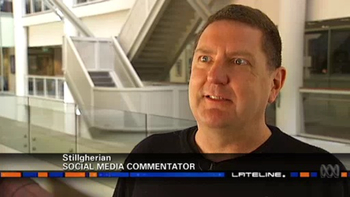
In a week when many of Australia’s political journalists and commentators have once again proven themselves inadequate for the job, I revisit a proposal first made in February 2012.
Continue reading “The 9pm Recycled Edict 2: A Modest Proposal”
Word-whore. I write 'em. I talk 'em. Information, politics, media, and the cybers. I drink. I use bad words. All publication is a political act. All communication is propaganda. All art is pornography. All business is personal. All hail Eris! Vive les poissons rouges sauvages!

In a week when many of Australia’s political journalists and commentators have once again proven themselves inadequate for the job, I revisit a proposal first made in February 2012.
Continue reading “The 9pm Recycled Edict 2: A Modest Proposal” Earlier this week Target Australia announced that it was pulling Grand Theft Auto V from its shelves after an online petition gathered 41,000 signatures protesting the game’s depictions of violence against women. “Targetgate” soon became the label, of course — and it stuck even when Kmart Australia followed suit.
Earlier this week Target Australia announced that it was pulling Grand Theft Auto V from its shelves after an online petition gathered 41,000 signatures protesting the game’s depictions of violence against women. “Targetgate” soon became the label, of course — and it stuck even when Kmart Australia followed suit.
On Thursday I discussed the issue with Louise Saunders on ABC 936 Hobart, covering much the same territory as journalist Alex Kidman did in his opinion piece at Fat Duck Tech.
This is obviously a complex issue, especially in the wake of the continuing Gamergate furore, but because I’d previously discussed Gamergate on Download This Show, I felt reasonably well-prepared. I’m told I skirted around the edge of the rabbit hole without going down it.
I’d be interested to know whether you agree.
Podcast: Play in new window | Download (6.2MB)
The audio is ©2014 Australian Broadcasting Corporation.
![]() I’ve appeared in The Saturday Paper for the first time today, in a story by journalist Martin McKenzie-Murray with the headline Web of abuse grows as online bullies spread malice. In my very first quoted sentence in this august journal, I drop the c-word.
I’ve appeared in The Saturday Paper for the first time today, in a story by journalist Martin McKenzie-Murray with the headline Web of abuse grows as online bullies spread malice. In my very first quoted sentence in this august journal, I drop the c-word.
It’s a talent.
McKenzie-Murray’s story is great. It explores the same issue as we discussed on ABC TV’s Lateline the other night, namely the hideous violent and sexually-explicit abuse women face online, and the rather disappointing response from the police. Once more, it’s based around the experiences of Caitlin Roper.
McKenzie-Murray goes further, though, and speaks to Roper’s key abuser.
“I disagreed with some of her [Roper’s] statements [about Ched Evans]. I used the word ‘rape’ only for effect however she took it personally. I’ve said many times before that logic would explain the fact that nobody intended on raping her and nobody wishes rape upon her. I did get carried away and did use some obscene language… however, they took a joke out of context and began a witch-hunt of sorts by posting my picture and personal information.”
“Logic,” eh? “Joke.”
It’s worth reading the article in full. Despite my presence in it.
 Last week Collective Shout activist and campaigns manager Caitlin Roper told her story of the horrific misogynist abuse she’d received online, and what can most politely be called a disappointing response from the police.
Last week Collective Shout activist and campaigns manager Caitlin Roper told her story of the horrific misogynist abuse she’d received online, and what can most politely be called a disappointing response from the police.
I reluctantly went to the police station, already knowing that threats against women online are not regarded as a priority. “Why don’t you just close down your account?” asked the officer taking my statement.
I explained how I used Twitter in the course of my work for a non-profit organisation. She pressed further — “but why do you need to use it?” — as if it was somehow unreasonable for me to believe I had as much right as anyone to access social media without threats
…
Another colleague went to the police after one man described how he intended to mutilate her body and dissolve it in acid. The police officer suggested that the internet was “not a very nice place”, and maybe she should stay off it.
Last night, ABC TV’s Lateline did a follow-up story, the reported being John Stewart, and I provided a few comments.
It’s interesting that the one piece they used was about the internet putting everyone right next to everyone else:
It’s simply that within the past people were in communities, that were mostly made up of people like them or people they grew up with. If there was a violent part of town or a red-light district or whatever it might be, and you didn’t want to go there or you didn’t want to know about it, well you just didn’t go there. The problem is now on the internet all of that is right next to you as well and people are shocked by this. They’re suddenly discovering that there are people not like them. They have different attitudes to women, different attitudes to acceptable language, to religion, to class, to sporting teams, to clothing as we’ve seen in the media lately. Everything.
I also said that thanks to the internet, we are now building a global society, and yet policing is organised on a regional or even local basis.
While these women, and so many others, have experienced appalling abuse, in most cases there’s no credible threat. Even if the police cranked up the mechanisms of transnational police cooperation, there’d be little chance of a prosecution leading to a conviction. Their lack of follow-up reflects that unfortunate reality, as well as many police officers’ unfamiliarity with online life.
I daresay I’ll have further thoughts in this, because this story certainly isn’t going away.
Yes, I know they spelt my name wrong. Yes, I know they said “social media commentator”.